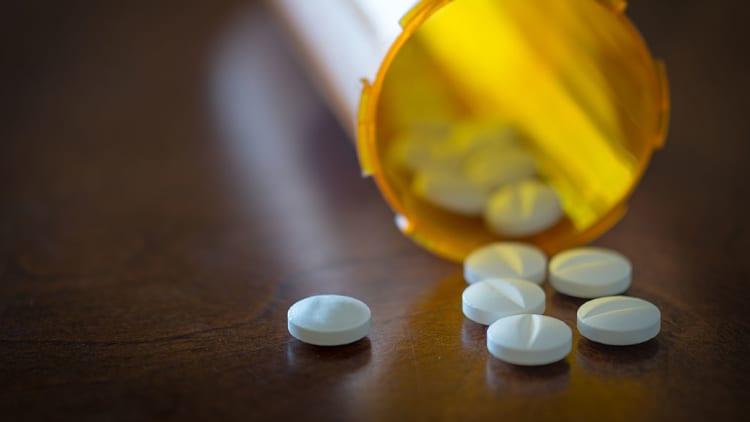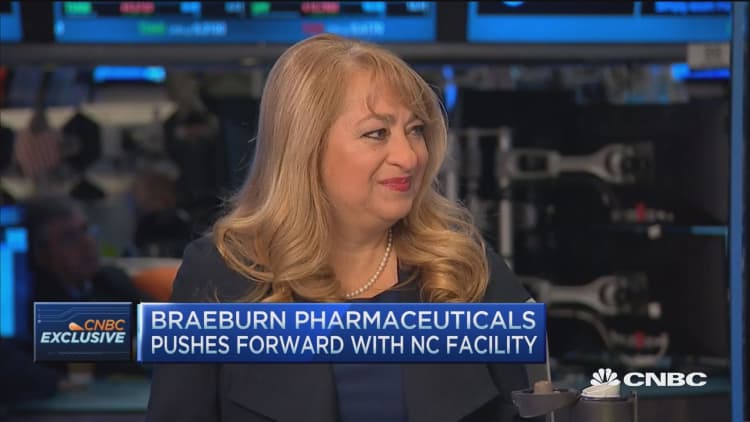
The first-ever implant used to treat opioid addiction won approval from federal regulators Thursday, providing yet another weapon in the battle against an epidemic of opioid use.
The Probuphine device approved by the Food and Drug Administration contains the medication buprenorphine. That drug in its oral form over the past 14 years has become a popular tool for eliminating opioid withdrawal symptoms in people addicted to heroin and prescription painkillers.
Probuphine, which will be available only by prescription, is being pitched by its backers as more convenient than traditional forms of buprepnorphine, and as a protection from having a user's buprenorphine diverted to someone else, stolen or accidentally taken by a child.
The FDA's approval was for patients who have already stabilized their dependency by taking 8 mg or less per day of buprenorphine, but doctors can, and do, often prescribe medications for off-label uses, which in this case would include new users of buprenorphine.
The implant was developed by Titan Pharmaceuticals and is licensed to Braeburn Pharmaceuticals for sale in North America, which is the largest market by far for drugs to treat opioid dependence.
Upward of 80 people fatally overdose on opioids each day in the United States.
Users of Probuphine will have its four small stick-like implants inserted in their upper arm during a doctor's visit lasting less than 15 minutes. The implant remains in the arm for six months before it is removed by a doctor.
Braeburn Pharmaceuticals reportedly has said it plans on pricing Probuphine competitively with other drugs that sell for around $1,000 and $1,500 per month, which is much more expensive than oral forms of buprenorphine.
"We have not announced specific pricing for Probuphine and will not do so until after the treatment is FDA approved," Braeburn CEO Behshad Sheldon said before Thursday's decision. "But, we can confirm that we will be priced lower than other long-acting medications currently on the market."
Sheldon also said that to ensure equal access to Probuphine for all patients, Braeburn will implement two initiatives.
One would be a exploring a rebate program for insurers, which "would mean that if the overall cost of care for a group of patients taking Probuphine exceeds the cost of treatment for the same patients in a prior six-month period, or a comparable group of patients taking other forms of buprenorphine (or other available opioid addiction medication) for a six-month period, Braeburn will give them a rebate for the difference," she said.
Braeburn also is establishing a payment assistance program for patients.
Sheldon told CNBC last month that there is already strong interest in Probuphine. About 4,000 doctors have asked to be trained in how to implant and remove the drug.
While 28,000 doctors are federally authorized to prescribe buprenorphine, only about 6,000 currently write about 90 percent of the total prescriptions in the U.S.
Research has shown that recovering addicts who do not manage their dependence with medication are significantly more likely to relapse into illicit drug use than people who take buprenorphine, which is often sold under the brand name Suboxone, or other medications including methadone and naltrexone. About a quarter of the 2.8 million people estimated to have diagnosed opioid abuse disorder take buprenorphine.
"Scientific evidence suggests that maintenance treatment with these medications in the context of behavioral treatment and recovery support are more effective in the treatment of opioid use disorder than short-term detoxification programs aimed at abstinence," said Dr. Nora Volkow, director of the National Institute on Drug Abuse at the National Institutes of Health.
Referring to Probuphine, Volkow said, "This product will expand the treatment alternatives available to people suffering from an opioid use disorder."
Sheldon of Braeburn said, "Opioid addiction is a chronic disease and should be treated the same way we treat other serious, chronic diseases — with evidence-based medicine."
"Probuphine is the first of what we hope will be many new and innovative approaches to treating this disease," Sheldon said.
The FDA, in a press release, said, "Until today, buprenorphine for the treatment of opioid dependence was only approved as a pill or a film placed under the tongue or on the inside of a person's cheek until it dissolved."
"While effective, a pill or film may be lost, forgotten or stolen," the FDA said. "However, as an implant, Probuphine provides a new treatment option for people in recovery who may value the unique benefits of a six-month implant compared to other forms of buprenorphine, such as the possibility of improved patient convenience from not needing to take medication on a daily basis."
FDA Commissioner Robert M. Califf, M.D, said, "Opioid abuse and addiction have taken a devastating toll on American families. We must do everything we can to make new, innovative treatment options available that can help patients regain control over their lives."
"Today's approval provides the first-ever implantable option to support patients' efforts to maintain treatment as part of their overall recovery program," Califf said.

The FDA approval comes after a trial last year which showed that Probuphine users who already were on buprenorphine did not, as a group, have worse outcomes than other buprenorphine users who received a placebo form of the implant.
The trial found that more than 96 percent of the Probuphine users had been free of any opioid use for at least four months, compared with 87.6 percent of people who used the oral form of buphrenorphine.
And almost 86 percent of the people who used Probuphine in the trial managed to stay off illicit opioids for the entire six months, which was nearly 14 percentage points better than the group that used oral versions containing buprenorphine.
Earlier this month, Dr. Richard Rosenthal, medical director of addiction psychiatry in the Mount Sinai Behavioral Health System in New York City, and the investigator for the Probuphine trial, told CNBC that, "What this means is that in the population that we were treating, there's an advantage, probably, to having an implant."
Rosenthal, in contending Probuphine should be approved, said, "We've got an epidemic."
"We want to get people to get treatment. And the relapse rates for when people [aren't on dependency-controlling medication] are abysmal."
The FDA's approval of Probuphine comes two years after the agency approved a new oral form of buprenorphine, Bunavail, made by BioDelivery Sciences. Bunavail adheres to the inside of users' cheeks, allowing them to talk, swallow and otherwise go about their normal activities as the medication is absorbed.
Other forms of buprenorphine require users to hold a pill under their tongue for 15 minutes without swallowing.




